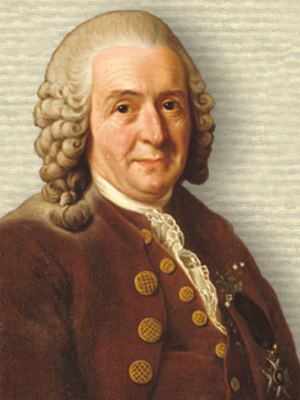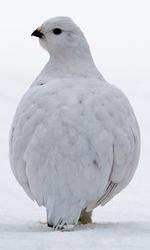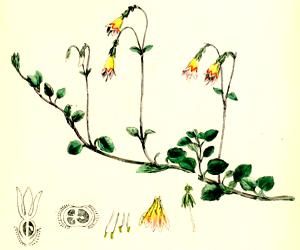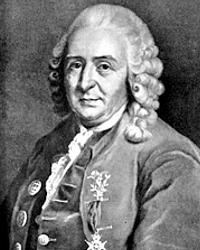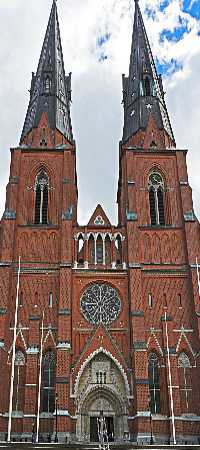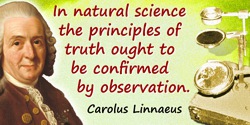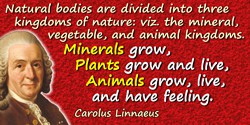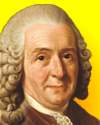 (source)
(source)
|
Carolus Linnaeus
(23 May 1707 - 10 Jan 1778)
Swedish botanist and explorer who established the first precise biological classification, with a uniform system for naming organisms by genera and species of organisms.
|
CARL LINNÆUS
from Famous Men of Science (1926)
by Sarah K. Bolton
[p.47] In the Swedish town of Upsala sleeps the man who, more than any other, has immortalized Upsala University, and helped to make Sweden an intellectual and studious country. Near by is the monument of dark porphyry, with the plain, shaven face in bronze, wreathed with laurel, and the words “Carolo a Linné Botanicorum Principi Amici et Discipuli, 1798.”
Nearby is the Botanic Garden, which Linnæus so loved and developed, and the two-and-a-half-story stuccoed house where the great naturalist lived and entertained princes. Under these dark poplars, enormous in size, he taught the pupils who came from all parts of the world to hear him. The dark, closed blinds are as he left them, for Sweden would not change one thing about the precious home. Too little in our own country do we treasure the homes of those who give honor to the nation.
The history of Linnæus is, indeed, a romance. Few have had such great struggles with poverty; few have come off such conquerors. Few lives have given to the world such lessons of cheerfulness, of perseverance, and of untiring industry. He was born, May, 1707, at Rashult, in the south of Sweden, the son of a poor minister, and the eldest of five children. The father, Nils Linnæus, had obtained his education by the hardest toil, and, while he had only poverty to offer his family, he gave them what money could not buy, tender affection, and the inspiring influence of a cultivated mind that loved nature and studied her closely. His mother, Christina, a woman of sense, prudence, and good judgment, was his [p.48] idol. She wrote of her in later years: “She possessed the virtues of her sex, devoting the utmost attention to impressing on my mind the love of virtue, both in precept and example.”
From a child he was fond of his father’s garden and gathered from the fields all kinds of wild flowers. He says of himself in his autobiography: “He was scarcely four years old when he accompanied his father at a feast at Mökler, and in the evening, it being a very pleasant season of the year, the guests seated themselves on some flowery turf, listening to the pastor, who made various remarks on the names and properties of the plants showing them the roots of the succisa, tormentilla, orchids, etc. The child paid the most uninterrupted attention to all he saw and heard, and from that hour never ceased harassing his father about the name, qualities, and nature of every plant he met with; indeed, he very often asked more than his father was able to answer, but, like other children, he used immediately to forget what he had learned, and especially the names of plants. Hence the father was sometimes put out of humor, and refused to answer him unless he would promise to remember what was told him. Nor had this harshness any bad effect, for he afterward retained with ease whatever he heard.”
When he was eight, a piece of ground was assigned him, which was called “Carl’s Garden.” Here he gathered plants, and flowers, and introduced so many rare weeds that his father had great trouble in eradicating them! So interested did Carl become, that he had nests of wild bees and wasps, not agreeable playthings usually.
But the play days with weeds and wasps came to an end, for the bright boy had to go to school. His first teacher was “a passionate and morose man, better calculated for extinguishing a youth’s talents than for improving them,” and the next “pursued the same methods, [p.49] preferring stripes and punishments to encouragements and admonitions.” There was little time now for the precious study of flowers. At seventeen he had to go to a gymnasium or high school, where he would be taught classics, and made ready for the ministry, like his father. He had no fondness for the languages, neither for theology or metaphysics: but having obtained two books on botany, he read them day and night, committing them to memory. The teachers and scholars called him “the little botanist.”
What was his father’s chagrin, when he came to the school to visit him, to hear that Carl was quite unfit for the ministry, but would probably make a good tailor or shoemaker! Poor as he was, he had kept his boy at school for about twelve years. Now, well-nigh disheartened, he stopped, on his way home, to confer with his family physician, Dr. Rothmann. That good man suggested that the boy might like medicine, and accomplish great things in natural history. He offered to take him into his own home, and give him lessons in physiology, which kind proposal the father accepted, though with little faith. The doctor also taught him botany, and Carl grew happy under the new régime.
The next year he was sent to the University of Lund, with the following not very creditable certificate from the head master of the gymnasium: “Youth at school may be compared to shrubs in a garden, which will sometimes, though rarely, elude all the care of the gardener, but if transplanted into a different soil, may become fruitful trees. With this view, therefore, and no other, the bearer is sent to the University, where it is possible that he may meet with a climate propitious to his progress.” Through a friend, entrance was obtained without showing the obnoxious certificate.
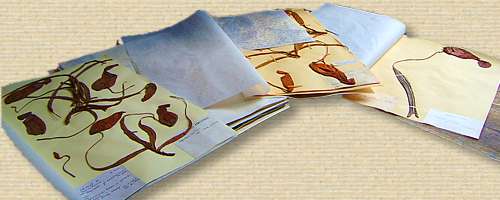
Carl took lodgings at the house of Dr. Stobæus, physician [p.50] to the king, who gave him access to his minerals, shells, and dried plants. Delighted at this, the youth at once began to make a collection of his own, and glue them on paper. He longed to gain access to Dr. Stobæus’s library, but how should it be accomplished? Finally a young German student, to whom he taught physiology, surreptitiously gained the books needed, and young Linnæus spent nearly the whole nights in reading. The doctor’s aged mother did not understand why their lodger kept his light burning into the small hours, and besought her son to investigate. He did so, and found the crestfallen Carl reading his own library books. He forgave the student, took him to his own table and treated him as a son.
Advised by Dr. Rothmann to go to Upsala for better medical opportunities, he proceeded thither, and here began his bitterest poverty. His father could give him only forty dollars. As he was unknown, and without influence, he could obtain no private pupils. Starvation actually stared him in the face. He says, “he was obliged to trust to chance for a meal, and in the article of dress, was reduced to such shifts that he was obliged, when his shoes required mending, to patch them with folded paper, in stead of sending them to the cobbler.” Often hungry and half clothed, there seemed nothing before the poor Swedish lad but obscurity and early death.
One day in autumn, as he was examining some plants in the Academical Garden, a venerable clergyman, Dr. Olaf Celsius* saw him, and asked him where he came from, how long he had been at the college, and what he knew about plants. He, too, was interested in botany, and was preparing a work on the plants mentioned in the Bible. Perhaps something in Carl’s face or manner touched the minister’s heart, for he asked him to go home [p.51] with him, and soon offered him board in his own house, and gave him access to his valuable library.
The tide of adversity was beginning to turn. Some pupils were obtained, and a little money flowed into the empty pockets. At twenty-two, by a close examination of the stamens and pistils of flowers, he decided upon a new method of arrangement by the sexes of plants, which, in after years, became the basis of his great fame. This procured him the appointment of Assistant Lecturer to Dr. Rudbeck in the Botanical Garden, where, but a year before, he had asked to be the gardener!
He now had a little money, and, what was equally useful, some leisure time. He began his great works, which were not completed for seven years, “Bibliotheca Botanica,” “Classes Plantarum,” “Critica Botanica,” and “Genera Plantarum,” “letting,” as he said, “not a minute pass unoccupied during his residence at Upsala. For the latter work he examined the characters of eight thousand flowers.”
Scarcely had he begun this valuable labor, when the envy of one of the professors became as hard to bear as his previous poverty, and, through friends, he obtained an appointment to study the natural history of Lapland. It was a hazardous expedition for a young man of twenty-five. Now he climbed steep rocks, “which,” he says, “broke loose from a spot which my late guide had just passed, and fell exactly where I had been, with such force that it struck fire as it went.” Once, when floating down a river, the raft parted in the middle, and he narrowly escaped drowning. “All my food,” he says, “in those fatiguing excursions, consisted, for the most part, of fish and reindeer’s milk. Bread, salt, and what is found everywhere else, did but seldom recreate my palate.” He travelled nearly four thousand miles, mostly on foot [p.52] often through bogs and marshes, with the water to his knees, yet always cheerful, always enthusiastic. On presenting his report to the University, on his return home, they gave him about fifty dollars for his travelling expenses for five months!
A single incident shows the tender heart of the young explorer. Very few birds were visible except the ptarmigan. He says: “The little Alpine variety of the ptarmigan was now accompanied by its young. I caught one of these, upon which the hen ran so close to me that I could, easily have taken her also. She kept continually jumping round and round me, but I thought it a pity to deprive the tender brood of their mother; neither would my compassion for the mother allow me long to detain her offspring, which I returned to her in safety.” Tenderness to animals seems to be a striking characteristic of great men and women.
During the journey, he found a modest little flower in the great northern forests, in the moss, and this he named Linnæa borealis, thinking it was so like himself, expanding in obscurity. He chose for his motto, Tantus amor florum, “So great is the love for flowers.”
On his return to Upsala, he began courses of private lectures in medicine, but so bitter was the envy of the before-mentioned professor that the archbishop was prevailed upon to prohibit private lectures. Thus deprived of a livelihood, Linnæus turned his attention to mineralogy, visiting the Swedish mines. The Governor of Dalecarlia was so pleased with him that he engaged him to investigate the productions of his country. Here he fell in love with the daughter of John Morseus, a well-to-do physician.
Sara Elizabeth reciprocated the affections of the young man, who was told by the father that he must wait three years for a final answer; for, in truth, Linnæus’s financial [p.53] prospects were not bright. The University of Upsala did not want him, and there seemed to he no hope of writing or publishing his hooks on botany. But a man usually achieves little, who does not fight his way at every step. Now, indeed, for love’s sake he must make his mark.
After saving about seventy-five dollars, he decided to go to Germany, and take his doctor’s degree; but first he must visit his home, out of which his beloved mother had gone at forty-five. “Alas! alas, my mother!” was all he could say, as the tears fell fast upon her grave. She had witnessed his poverty and his heroism; she was not to witness his great renown.
At Hamburg he spent a month, receiving civilities from many scientific men. He showed his good sense in feeling in no wise humiliated because he was poor, a valuable lesson for poor young men and women to learn. At Leyden, good fortune came to him. Dr. Gronovius was so pleased with the manuscript of his “Systema Naturæ” that he requested to publish it at his own expense. By his advice, Carl waited upon the celebrated physician, Boerhaave, and after eight days gained admittance. So famous was this man that when the Emperor of China sent a letter to “Boerhaave, the famous physician in Europe,” it easily reached him. He advised a rich banker, Mr. Clifford, to have Linnæus describe his magnificent collection of plants, and to send him to England and else where, to collect specimens for him. This was indeed a blessing. “Here in England,” he says, “I lived like a prince, and had one of the finest gardens of the world under my inspection.” A society in Amsterdam advanced the money to pay for the plates for his “Flora Lapponica,” and fame seemed really to be coming at last.
In his visit to England, Sir Hans Sloane, who founded the British Museum, looked upon him coldly because he had suggested a different system in natural history from [p.54] his own! At Oxford, Dillenius said to friends, sarcastically: ‘See, this is the young man who confounds all botany!” Linnæus felt hurt, and, when about to take his departure from the city, asked the scientist why he had treated him thus. After the young student had explained his work, Dillenius became his warm friend, and pressed him to stay, and even to share his salary with him. Linnæus was greatly pleased with London, and when he saw the golden furze in its green leaves, fell on his knees before it.
On his return to Germany he went to the deathbed of Boerhaave, whose parting words were: “I have lived out my time and done what I could. May God preserve thee, from whom the world expects much more! Fare well, my dear Linnæus!”
He now hastened to the idol of his heart in Sweden, and what was his amazement to find that the friend to whom he had intrusted his correspondence with Sara Elizabeth had been trying to win her for himself! Perhaps it would have been quite as well for Linnæus had he succeeded! However, matters were amicably adjusted, and the long waiting lovers became engaged.
He repaired at once to Stockholm to begin .the practice of medicine, still keeping as near Upsala University as possible. And here troubles began anew. He says: “Being unknown to everybody, people were unwilling to trust their lives in my hands. Nay, they even hesitated to trust me with their dogs! Abroad, I had been honored in every place as Princeps Botanicorum; but in my own country I was looked upon as a Klim, newly arrived from the subterranean regions! No one cared how many sleep less nights and toilsome hours I passed. Had I not been in love I would certainly have left Sweden and gone abroad.”
After a time a fortunate cure effected by him brought [p.55] him speedy popularity. “No invalid could now recover without my assistance. I was busy from four in the morning till late in the evening; nor were my nights left undisturbed.” He was soon chosen a member of the Upsala Academy, and at the request of the king, through his tutor, Count Tessin, gave public lectures on botany and mineralogy.
And now the rising botanist desired to claim his bride. They were accordingly married June 26, 1739, when Linnæus was thirty-two. Dr. Moræus had waited long enough to see that his daughter was making no mistake. Life now flowed on smoothly. If the “little wife,” as he called her, governed him with no very gentle sway in after years, she had great influence over him, and it is said that at her instigation he persecuted his only son. All the more is Linnæus to be admired for accomplishing such a grand work with domestic hindrances. It takes a very great man to be great when his home is not a help to him! However, he always regarded her as “one of the choicest gifts bestowed upon him.”
His medical practice brought him plenty of money, but he wrote to a friend: “Once I had plants and no money: now what is money good for without plants?” Soon the desire of his heart was granted, and he was made Professor of Botany at Upsala University, also superintendent of the Botanical Garden.
Now he says: “I render thanks to the Almighty, who has ordered my lot so that I live at this day; and live, too, happier than the King of Persia. I think my self thus blessed because in this academic garden I am principal. This is my Rhodus, or, rather, my Elysium; here I enjoy the spoils of the East and the West, and, if I mistake not, that which far excels in beauty the garments of the Babylonians and the porcelain of China.”
His fame grew rapidly. He published, in 1745, his [p.56] “Flora Suecica,” and a year later his “Fauna Suecica,” a description of Swedish plants and animals. His lectures soon, by their enthusiasm and eloquence, brought listeners from all parts of Europe. The number of students in the university grew from five hundred to fifteen hundred, young men coming even from America to hear the great botanist. During the summer he made excursions twice a week, often at the head of two hundred students, and when some rare plant was discovered, the news was announced to the others by horn or trumpet. His scholars, imbued with his spirit, went over the world in scientific investigation. Some died in the Arabian deserts; some in the swamps of Africa. From foreign students he would take no fee, as he desired to show them how he loved his work. Once he said to a German student: Tell me, candidly, are you rich, and can you afford it? If you can, then give the money to my wife; but, if you be poor, so help me Heaven, I will not take a single farthing from you!”
Most of the scientific societies of Europe made him a member after his great works were published. The Imperial Academy called him “Dioscorides Secundus”; a gold medal was struck in his honor in 1746, and the king made him dean of the College of Physicians. He published two valuable medical books, and received the honor of the Knight of the Polar Star, never before conferred for literary merit. He was made a noble, and took for his motto, Famam extendere factis, adorning his crest with the little flower which he discovered in his poverty. He was made rector of the university, holding the position for several years. Plow different from the time when he could obtain only a chance meal, and covered up the holes in his torn shoes!
He bought two estates, living at one of them—Hammerby—for fifteen years. In 1774, when he was sixty-seven, [p.57] he suffered an attack of apoplexy in the Botanical Garden, and, two years later, another stroke made him a paralytic. When he could no longer walk, he used to be carried to his museum, and look long and earnestly at his treasures, gathered from every clime. His memory so failed him that he mixed the Greek and Latin letters, and forgot even his own name. On the 10th of January, 1778, death came to him in his sleep.
The university went into mourning, the king made a public address, and the whole nation regarded it as an irreparable loss. His herbarium and library were sold, after a time, by his wife, to Sir James E. Smith, the founder of the Linnæan Society, of London, where these treasures are now to be seen, and most of the one hundred and eighty works which he published during forty-five years. It is said that the King of Sweden, on learning that the work of Linnæus was going out of the country, sent a man-of-war to recover it, but without avail.
Linnæus was small in body, with large head, and the bright, piercing eyes which usually characterize men and women of genius.
Of his six children, the oldest soon became professor of botany, to assist, and then succeed, his father, but he lacked the parent’s just and honorable love of fame. The eldest daughter inherited much of his ability, being the first to discover the luminous property of the nasturtium flowers at night. Sara Elizabeth survived her noble husband many years, and now lies beside him in the cathedral.
- Science Quotes by Carolus Linnaeus.
- 23 May - short biography, births, deaths and events on date of Linnaeus's birth.
